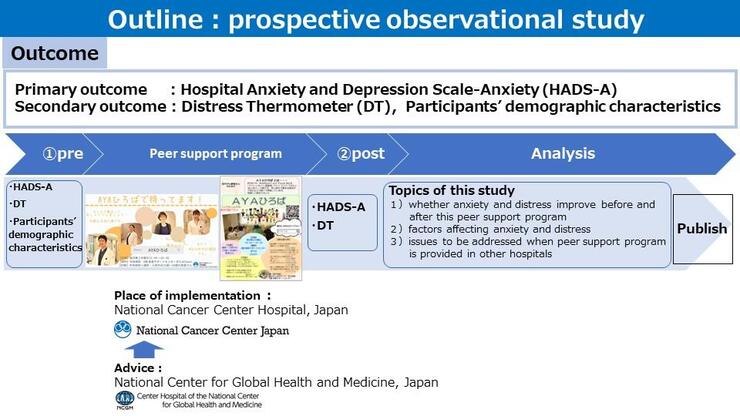Development of a peer support program for relief of psychological distress in adolescent and young adult cancer patients
Abstract
This study will examine whether an in-hospital peer support program for adolescent and young adult (AYA) (15-39 years old) cancer patients is effective in helping them cope with anxiety and feelings of distress.
In Japan, more than 20,000 new AYAs are diagnosed with cancer each year, representing approximately 2% of the total AYA population. The number of AYA cancer patients at each hospital is small, and the types of cancer are diverse, with various departments involved in the treatment of these patients. Therefore, the experience of each department is limited and the support of medical staff is insufficient. In addition, AYAs are growing both physically and psychosocially, which causes various distress and concerns. Against this background, support for the AYA generation has been designated as a priority issue in the Fourth Basic Plan for the Promotion of Cancer Control.
In addition to disease and treatment, AYA cancer patients have unmet needs such as those related to finances, work and study, and love and marriage, which lead to psychological distress and reduced quality of life. Peer support is expected to be effective, but the system for providing peer support is insufficient throughout Japan.
Therefore, we will measure anxiety and distress in AYA cancer patients before and after an in-hospital peer support program to determine whether this program effectively addresses these problems. We will clarify 1) whether anxiety and distress are reduced after peer support, 2) factors affecting anxiety and distress, and 3) issues to be addressed when peer support is provided in other hospitals.
This study is unique in that it examines the psychological effects of peer support academically, and the program is implemented in a hybrid format that allows either face-to-face or online participation to meet the needs of a variety of patients. The online format also makes it possible for individuals to participate in peer support from the comfort of their own homes or other locations, even during the COVID-19 pandemic. The results of this study will lead to the dissemination and implementation of peer support programs at other facilities nationwide, which will alleviate the psychological distress of increasing numbers of AYA cancer patients.
Perspectives
- Dissemination and implementation of an in-hospital peer support program for AYA cancer patients
- Development of an online peer support program that prioritizes ease of participation
- Alleviation of psychological distress in AYA cancer patients
Comments from principal researcher
As I administer this program, I realize the great power of peer support: the opportunity for AYA patients to share their feelings and ways of thinking with their contemporaries can give them the strength to face their illness and treatment. We hope that this study will lead to more chances for AYA cancer patients across Japan to meet others of their generation in hospitals, and that this will help reduce the anxiety that is natural during hospitalization.
Shared Researchers
- Akie Shindo
Department of Palliative Care, National Center for Global Health and Medicine, Japan

